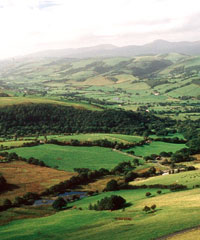MPs call for return to headage payments

Headage payments should be reconsidered as a way of helping hill farmers to stay in business, a report by a cross-party group of MPs has recommended.
The Environment, Food and Rural Affairs Committee’s report Farming in the Uplands – said that headage payments were the most effective way of supporting hill farmers.
These payments would remove difficulties faced by tenant farmers in accessing EU funds, which under the current system often went to the landowner instead, the report added.
EFRA chairwoman, Conservative MP Anne McIntosh, said the committee was not convinced by the government’s arguments for dismissing headage payments. “Headage payments would enable tenant farmers to access the funding they needed while meeting, or improving on, the current environmental conditions applied to CAP payments,” said Miss McIntosh.
“We recommend that the government looks again at the arguments for and against headage payments and explains the evidence base and grounds for opposing this method of supporting hill farmers in limited and specific circumstances,” she said.
The report was issued jointly by countryside watchdog, the Commission for Rural Communities.
“Like the commission we believe that changes must be made to the way in which CAP environmental payments are calculated,” said Miss McIntosh.
The report highlighted the shortcomings of the government in its failure to recognise and provide adequate support for hill farming businesses and upland communities. It recommended more should be done to encourage green diversification projects such as carbon storage and water quality schemes to bolster incomes.
“The government must ensure farm businesses provide a decent income for hard-pressed hill farmers. Farmers in the uplands already do a huge amount of unpaid work that benefits the public.
“The challenge for ministers is to find a way to reward farmers for those public benefits while preserving their way of life and the wonderful landscapes of our uplands,” she added.
Faced with the abolition of the CRC as part of government spending cuts, those living and working in the hills and uplands now needed the government to show a stronger commitment to their way of life.
DEFRA must also renew its support for the uplands and ensure that rural policies and their delivery were not neglected, the report said.
It concluded that a new strategy for the uplands was needed to set out a “clear action plan with practical measures, to be implemented immediately” and it called for strong leadership across all government departments to make sure that rural and upland communities got a fair deal.
“There needs to be a statutory definition of the uplands to assist the government in targeting policy and to make sure all farmers and rural communities can access development grants once Rural Development Agencies (RDAs) have also been abolished.
“These must work across government to put in place policies that support those that live and work in the uplands. In particular, rolling out super-fast broadband for remote rural communities and increasing the availability of affordable housing were also part of the conclusions. And there must be a statutory duty on National Parks to do more to encourage social and economic development,” the report added.
Share your thoughts on the future of UK hill farming on our forums.
